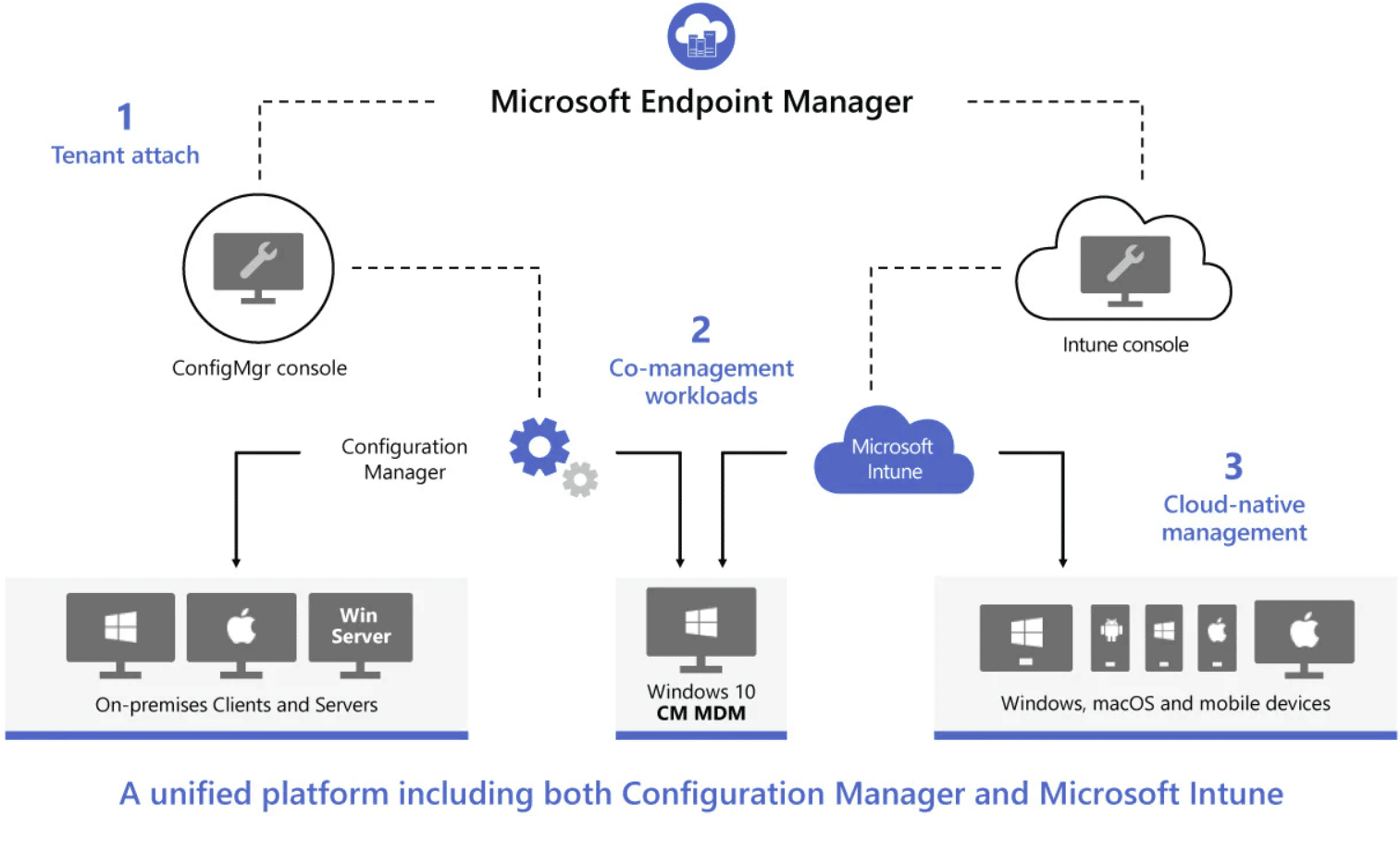Microsoft Endpoint Manager
Secure, deploy, and manage all users, apps, and devices without disruption to existing processes.
Home » IT Services » Cloud Services » Microsoft Endpoint Manager
Endpoint Manager combines services such Microsoft Intune, Configuration Manager, Windows Autopilot, Endpoint Analytics, Windows Defender and Azure AD.
When it comes to protecting and managing the range of devices on your business’s network, Microsoft Endpoint Manager stands as one of the most effective and comprehensive solutions available.
Learn all about Endpoint Manager, how it can benefit your business’s overall online security, and how Setup4 can manage it for you.
What is Microsoft Endpoint Manager?
Microsoft Endpoint Manager is a comprehensive, all-in-one endpoint security management platform that combines two key products: Microsoft Configuration Manager and Microsoft Intune.
Combined, they allow for on-premises and cloud-based management of all of your business’s endpoint devices, such as laptops, smartphones, printers, servers, and Internet of Things (IoT) devices.
Configuration Manager facilitates on-premises and a degree of cloud-based management, while Intune provides cloud-based unified management of endpoints.
Along with these two products, it includes other Microsoft 365 security and management capabilities.
Key Features of Microsoft Endpoint Manager
Within the umbrella of Microsoft Endpoint Manager, several security and feature sets allow you to take an all-encompassing approach to your endpoint security and management.
Along with Configuration Manager and Intune that enable extensive endpoint management both locally and through the cloud, other features of Endpoint Manager include:
Windows Autopilot
Windows Autopilot encompasses a range of technologies used for the setup and pre-configuration of new endpoint devices. This readies them for productive use and reduces the friction that can otherwise be experienced in setting up new devices on a server or network.
It allows IT professionals to initialise, manage, and retire devices from networks without the need for overly complicated infrastructure that could slow down these processes.
Endpoint Analytics
With Endpoint Analytics, IT professionals can assess the state of different devices within a network (local, remote, etc.).
It can provide important information on device performance, such as long boot times or slowed processes so that these issues can be resolved efficiently and potentially before an end-user (such as an employee on a computer) is notably impacted.
IT can optimise these devices as needed or know when a replacement is necessary if a piece of hardware’s overall performance severely depreciates.
Microsoft Defender for Endpoint
Microsoft Defender for Endpoint is an enterprise version of Microsoft Defender that protects against viruses, malware, and other persistent cyber security threats that can impact businesses with multiple endpoint devices.
As an enterprise solution, this version of Microsoft Defender scans and protects all endpoints within a set network and can deploy critical security updates and virus protection to all relevant devices as needed.
Microsoft Entra ID (formerly Azure Active Directory)
Whether you’ve heard of Azure AD or Entra ID, these are both the same product. It’s a cloud identity and access management system that protects your business’s network data.
It does this by providing businesses with the tools needed to manage users and devices, as well as providing secure access to corporate resources. This applies to resources that are either on-premises or stored in the cloud.
Benefits of Using Microsoft Endpoint Manager
The benefits of Endpoint Manager are sweeping, allowing you to comprehensively protect any device that is connected to it.
Of course, you’ll get the most benefit if your business is utilising the entire suite of Microsoft 365 programs, apps, and resources. Through an integrated system that connects Endpoint Manager to the broader Microsoft 365 suite, you’ll find all your devices will be effectively protected, regularly updated, and managed.
Best of all, every facet of this endpoint security, compliance, and updates can be handled from a single hub.
Device Security and Compliance with Microsoft Endpoint Manager
Endpoint Manager enables your business to secure your endpoint devices while also ensuring only compliant devices can access company Microsoft 365 resources such as SharePoint, Teams, Word, and more.
In addition to this, it allows administrators to manage mobile Microsoft 365 apps, such as Outlook. Being able to manage these apps helps when your employees are using their own mobile devices. Through Endpoint Manager, the corporate data can be protected without having to directly manage or interfere with any individual’s personal device.
With Microsoft Defender, all endpoint devices that are accessing your Microsoft 365 resources can be monitored and protected from threats.
App Management and Deployment with Microsoft Endpoint Manager
As Endpoint Manager directly integrates with Microsoft 365, it allows for effective deployment, updates, and management of Microsoft apps.
The range of 365 apps can be seamlessly deployed to Windows, macOS, and mobile devices so that your employees always have access to the latest versions. Updates can similarly be mass-distributed to all devices as needed.
Along with this, IT admins can access the Microsoft Store for Business, where they can then deploy any necessary apps directly from the store and onto user’s devices through Microsoft Intune.
Integration with Microsoft 365: Enhance Your Endpoint Management
As we’ve touched on a few times already, Endpoint Manager directly integrates with Microsoft’s comprehensive 365 suite of apps and resources. This makes it a perfect fit for any business that intends to utilise the entirety of Microsoft’s enterprise offerings.
Even if your business utilises other business tools outside of Microsoft, Endpoint Manager is a worthwhile investment if you’re still using most Microsoft products.
It’s also worth noting that the Intune component of Endpoint Manager can integrate with a wide range of third-party productivity apps, such as Slack, Adobe, Asana, Dropbox, Salesforce, and more. So along with comprehensive integration with native Microsoft apps, Endpoint Manager also plays well with several external apps, as well.
Setup4 can take care of all your endpoint security and management needs through our comprehensive Microsoft Endpoint Manager services. We’ll handle the IT and administrative components of the process, keeping your devices and network secured while you focus on your work.
To get started with us, get in touch today.
Microsoft Intune
Cloud-based unified management.
Configuration Manager
On-premises and cloud-based management.
Windows Autopilot
Simplified device deployment.
Endpoint Analytics
Data-driven recommendations.
Microsoft Defender for Endpoint
Endpoint protection from cyberthreats.
Azure AD
Universal platform to manage and secure identities.
Take advantage of the Microsoft Endpoint Manager with their integrated technologies configured with traditional configuration manager or have deployed Intune as their Microsoft device management (MDM).
If you are not using MDM technologies, purchasing Intune will open up the necessary licensing to start adoption. These come in three different options to choose from:
- A cloud only solution using Intune
- An on-premise solution using ConfigMgr
- A co-managed solution using both Intune and ConfigMr


Configuration Manager can help you
with systems management activities
- Increase IT productivity and efficiency by reducing manual tasks and focus on high-value projects.
- Maximise hardware and software investments.
- Empower user productivity by providing the right software at the right time.
- Secure and scalable deployment of applications, software updates, and operating systems.
- Real-time actions on managed devices.
- Cloud-powered analytics and management for on-premises and internet-based devices.
- Compliance settings management.
- Comprehensive management of servers, desktops, and laptops.
Configuration Manager helps deliver more effective IT services
Configuration Manager can integrate
with many Microsoft technologies
and solutions
- Microsoft Intune to co-manage a wide variety of mobile device platforms
- Microsoft Azure to host cloud services to extend your management services
- Windows Server Update Services (WSUS) to manage software updates
- Certificate Services
- Exchange Server and Exchange Online
- Group Policy
- DNS
- Windows Automated Deployment Kit (Windows ADK) and the User State Migration Tool (USMT)
- Windows Deployment Services (WDS)
- Remote Desktop and Remote Assistance
- Active Directory Domain Services and Azure Active
Directory for security, service location, configuration,
and to discover the users and devices that you want to manage. - Microsoft SQL Server as a distributed change
management database—and integrates with SQL Server Reporting Services (SSRS) to produce reports to monitor
and track management activities. - Site system roles that extend management functionality
and use the web services of Internet Information Services (IIS). - Delivery Optimization, Windows Low Extra Delay
Background Transport (LEDBAT), Background Intelligent Transfer Service (BITS), BranchCache, and other peer
caching technologies to help manage content on your networks and between devices.
Configuration Manager can also be used in
Microsoft Endpoint Manager FAQs
What is Microsoft Endpoint Manager?
Microsoft Endpoint Manager is a combined platform that allows easy management and control over devices in the office and in remote locations. This solution integrates two formerly separate products: Microsoft Intune and System Center Configuration Manager (SCCM) and other Microsoft 365 security and management capabilities.
What are the uses of Microsoft Endpoint Manager?
Here’s a brief overview of what Microsoft Endpoint Manager does:
Unified Endpoint Management (UEM):
The platform allows you to manage all endpoints, including desktops, laptops, smartphones, tablets, and even IoT devices, from a single console.
Data Protection:
Microsoft Endpoint Manager offers robust security features, including conditional access and compliance policies, ensuring your organisation’s data remains secure.
Device Configuration and Management:
It enables you to deploy and configure Windows, macOS, iOS, Android, and Windows IoT devices. You can manage settings, features, and security from a centralised location.
Application Management:
It allows you to manage, distribute, and update applications across all devices in your organisation.
Cloud and On-Premises Integration: It bridges traditional on-premises management through SCCM and cloud-based management through Intune, offering flexibility based on your organisation’s needs.
Simply put, Microsoft Endpoint Manager optimises endpoint management, providing a versatile platform for managing devices and applications across an enterprise while ensuring security and compliance.
How can a business use Microsoft Endpoint Manager?
Microsoft Endpoint Manager can bring substantial benefits to a business, enhancing efficiency, security, and flexibility:
Streamlined Application Management:
Microsoft Endpoint Manager allows businesses to manage, distribute, and update applications across a diverse array of devices seamlessly. This capability is crucial in today’s business environment, where timely software updates are necessary to ensure productivity and security. It also allows businesses to deploy critical software applications efficiently, minimising downtime and ensuring all employees have the tools they need to perform their jobs effectively.
Flexibility and Adaptability:
Microsoft Endpoint Manager effectively bridges the gap between traditional on-premises and cloud-based management. This flexibility means businesses are no longer restricted to a single mode of operation but can choose a model that best fits their operational needs and future growth plans. This flexibility is particularly beneficial for businesses undergoing digital transformations or those seeking to modernise their IT infrastructure.
Cost-Effectiveness:
Microsoft Endpoint Manager integrates several management and security solutions into a single platform, which can lead to significant cost savings. Instead of investing in multiple standalone solutions, businesses can leverage the comprehensive capabilities of Microsoft Endpoint Manager. The Manager reduces the complexity and cost of managing multiple systems, leading to more streamlined operations and lower IT costs.
Scalability:
As a cloud-based solution, Microsoft Endpoint Manager is easily scalable, making it an excellent solution for businesses of all sizes, from small companies to large enterprises. Microsoft Endpoint Manager can scale to accommodate more devices, and complex management needs as the business grows and evolves. This scalability ensures companies can continue to manage their devices effectively, regardless of how much they grow or how their needs change over time.
How do I get Microsoft Endpoint Manager services in Australia?
Obtaining Microsoft Endpoint Manager services in Australia is a breeze, thanks to Setup4. As a leading IT solutions provider, we can guide you through the processes and ensure a seamless transition.
You can contact the Setup4 team by booking a meeting with us today. Our experienced professionals will conduct a thorough consultation to understand your needs and tailor a solution that perfectly aligns with your business requirements.
Setup4 will handle the implementation process and ensure all devices are integrated effectively. To book a meeting, get in touch with us today.
Have a Project in mind?
Let's have a chat with our Experts.
Need to talk to an IT Expert? Fill out the form and one of our experts will get in touch with you very shortly.
If you prefer to give us a call, we are ready to talk to you.
We are Easy to Reach
What You Get
- We Phone and Email You
- Cost Estimate of your project
- In-Person Visit


